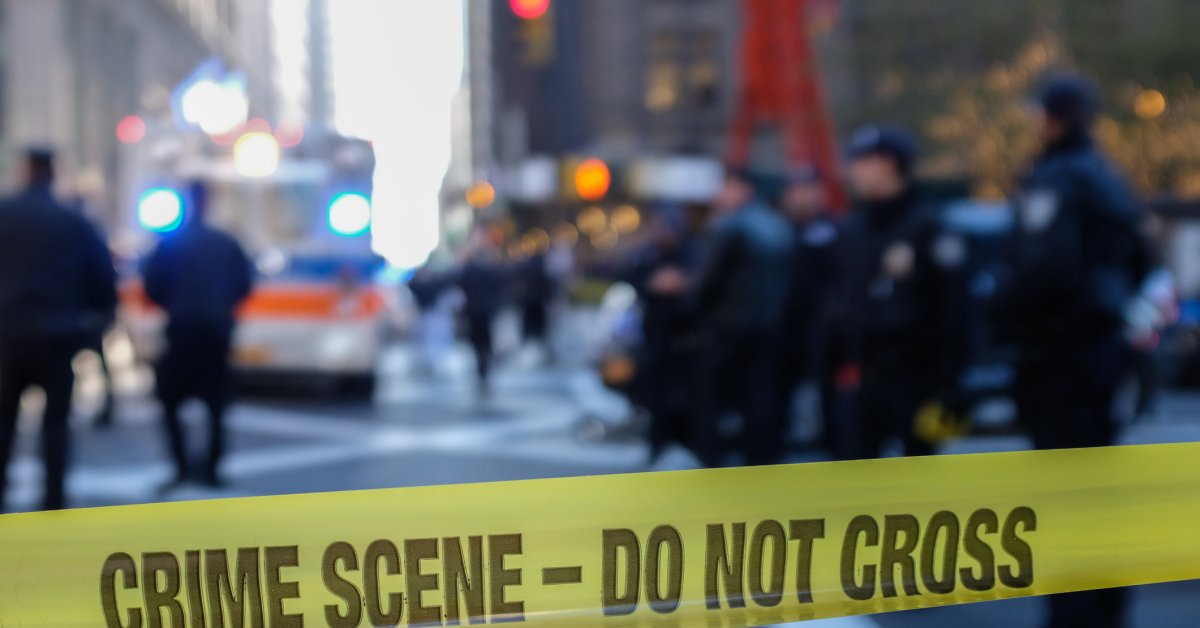Many Americans do not know that U.S. police are permitted to outright lie about evidence to someone they bring into the station for questioning. This is not lawful in most western countries. Incomprehensibly, they are even permitted to lie to children. Try explaining that to parents.
This form of deception has tricked countless innocent people into confessing to crimes they did not commit. “We have surveillance footage of you that night,” “Your shoe prints were at the crime scene,” “Cell phone records prove you were there,” “You failed the polygraph,” “Your DNA was on the victim,” and “Your friend said she wasn’t with you like you said” are some all-too-common but real examples.
In Frazier v. Cupp (1969), the Supreme Court made it lawful for the police to present false evidence. Despite enormous amounts of research and thousands of wrongful convictions since that time, the Court has not revisited this issue. That is why lawmakers must step in to rectify the situation.
There is almost no limit to the type of deception permitted—one lie or many; small lies and big. Whether aimed at anxious children or adults, the effects can be devastating.
In one case, in 1973, a Conn. police sergeant accused 18-year-old Peter Reilly of killing his mother. No witnesses or physical evidence implicated Reilly, who had no history of violence. Yet after hours of interrogation and denials, the sergeant told Reilly that he failed a polygraph exam. Eventually, this disorienting result led Reilly to question his own innocence. “This test is giving me doubts right now,” he conceded. Led to believe that he blocked the event from consciousness, Reilly later said “Well, it really looks like I did it.” Later still, he confessed to slashing his mother’s throat with a razor. After Reilly was convicted, and spent time in prison, the prosecutor discovered exculpatory evidence in his case file and all charges were dismissed.
In a second case, 20 years later, 41-year-old Gary Gauger woke up on the family farm in Ill. and found his parents stabbed to death. Detectives said they found blood-soaked clothes in his bedroom and a bloody knife in his pocket—both lies. They also falsely claimed that he failed a polygraph. Gauger broke down and concluded that he must have killed his parents during an alcohol-induced blackout. After five years in prison, including time spent on death row, he was released; two motorcycle gang members were later convicted of the murders.
This type of deception continues unabated to this day. In 2014, 22-year-old Malthe Thomsen, born in Denmark, traveled to New York City for a teaching internship at a preschool. Based on an allegation from an unreliable source, a sex crimes detective interrogated him for hours and told him that surveillance videos showed him touching children in sexual ways. No such footage existed. A confused Thomsen signed a confession and then went on camera: “This morning,” he said, “ I had a rude awakening.” Thomsen was arrested, charged, vilified in local newspapers, and sent to Rikers Island before prosecutors dismissed all charges. (Five years later, Thomsen died of a blood clot in his heart.)
I could spend hours detailing the damage caused by this ruse—not only to innocent people wrongfully incarcerated because they were duped into confession, but to future victims of the actual perpetrators of those crimes who escaped prosecution only later to reoffend.
Read More: The U.S. Prison System Doesn’t Value True Justice
Within the scientific community, proof of the risk posed by the false evidence ploy is beyond dispute. Basic psychology research in a multitude of venues shows that misinformation can alter people’s visual perceptions, beliefs, emotions, physiological states, memories, and the decisions they make. Across the board, these effects are found in adults; they are even greater in children. Recent experiments specifically replicate the effect on confessions.
In 2021, Ill. and Ore. passed laws that ban police from lying to children and adolescents brought in for interrogation. In 2022, similar bills were passed by state legislatures in Calif., Utah, and Del. Coming up in 2023, Colo. will present a bill specifically aimed to protect youthful suspects.
These developments represent a significant first step in the right direction. Yet more reform is still necessary. Conn. and N.Y. are poised to consider more inclusive bills that would similarly protect adults. Still other states have also begun to study the issue. Hopefully, all remaining states, the District of Columbia, and federal law enforcement agencies will follow, prompting much needed changes to interrogation training and practice nationwide.
At this point, you may think that passing a law to prevent police from lying to suspects about evidence is a no brainer. Yet these efforts have met with stiff resistance.
Last spring, I testified in Colo, on behalf of a bill that would have banned lying to youthful suspects—or, to put it bluntly, children (ultimately, this bill failed to pass). Before it was my turn, I watched a parade of law enforcement opposition witnesses. Essentially, they argued that the sky would fall, that they could not solve crimes without the tools of deception.
One witness said, “Juveniles are afforded an extreme amount of protections” (he was referring to Miranda and the presence of a parent, neither of which has proved protective of innocent kids, lying or not).
A second witness countered sarcastically with an alternative proposal, “I’m wondering if we should come up with a bill that it’s illegal to lie to the police.”
A third witness put it this way: “Public safety has got to be paramount, it’s got to be first.” This latter criticism was later echoed by a state senator, formerly a sheriff, who referred to the bill as “pro-criminal” and “anti-public safety.”
Let me address this public safety argument head on. In 2020, criminologist Robert Norris and others examined 109 wrongful convictions in which the DNA also went on to identify the actual perpetrator. In 94% of these cases, those perpetrators who had escaped arrest and prosecution went on to commit 337 additional offenses, including numerous murders and rapes.
When police and prosecutors close a case on an innocent person, the real perpetrator remains free on the street, locked, loaded, and poised to reoffend.
One might think that the positions expressed by these witnesses represents the law enforcement position—as if there is only one. Not so. In fact, there are alternative views shared by some of the most experienced interviewers from criminal justice, national security, and military settings who support the proposed ban.
What follows is a remarkable group of investigators with experiences in the U.S. Navy, the U.S. Air Force, the United Kingdom, Tempe, Ariz. Chicago, Ill. Morristown, N.J., and Washington D.C. Consider these highly informed practitioners, aligned with the science, in their own words.
- Mark Fallon: “I spent more than three decades as a national security professional, primarily as a special agent with NCIS. I have conducted interrogations in the United States and internationally, including during military operations. I also chaired the Research Committee of the High Value Detainee Interrogation Group (a three- agency entity of the FBI, CIA, and DoD). There are far too many confession-driven practices that exploit weaknesses and lack dignity. Police should be banned from lying to suspects during interrogation. False confessions continue to result in wrongful convictions. Trust must be restored between police and the public served.”
- Stuart Greer: “I have been a police officer for 25 years. As a detective and investigative supervisor in northern N.J., I used deception to obtain confessions from subjects I believed were guilty. I knew it was permissible, I thought it was effective, and I saw it as a means to a justifiable end. I now believe I was wrong. Deception can lead vulnerable people to confess to crimes they did not commit. We must now accept that change is needed. Non-coercive information-gathering techniques that are effective, humane, and used by police around the world should be adopted here in the United States. Anything else is just unacceptable.”
- Andy Griffiths: “I was a senior investigating officer with the U.K. police and obtained my PhD examining real-life murder and rape interviews. The U.K. banned deception and other coercive tactics during my police service, and I saw the positive effects of that change directly. When lying was banned, thereby removing the opportunity to ‘invent’ evidence, forensic evidence was more widely used, training improved, and, gradually, coerced false confessions ceased. A ban on lying to suspects is a significant step forward in criminal justice and law enforcement.”
- Matt Jones: “I am a retired homicide detective from Tempe, Ariz. and founder of Evocavi LLC, a company that trains city, state, federal, and corporate security investigators in science-based interview techniques. The investigator who lies about evidence loses credibility, risks false confessions, and undermines the appearance of fairness in court. To my fellow brothers and sisters in law enforcement: you do not need to lie to get confessions. To the interview training companies in the U.S. that still promote deception: it’s time to move on. To prosecutors: police will follow your lead if you would have the courage to advise them accordingly.”
- Steven Kleinman: “I am a retired Colonel with the U.S. Air Force. Having interrogated foreign military officers, terrorists, and violent extremists, I have learned that the Truth is something to be leveraged not concealed. Engaging with a subject in a forthright manner elicits key information disclosures. Diligent investigative work and skilled interviewing will reliably uncover the facts even in complex cases without diluting the public’s trust. In contrast, misleading individuals as to the nature and/or extent of the evidence increases the incidence of false confessions, an insidious phenomenon that continues to plague this nation.”
- David Thompson: “I am President of Wicklander-Zulawski & Associates, Inc., a law enforcement consulting and training organization based in Chicago. Our objective is to ensure that investigators use evidence-based practical tools. When a credible authority figure lies to a suspect about evidence, those lies can produce contaminated statements from the guilty party and false confessions from the innocent. The risks are even greater with youthful suspects. Trust is essential to police-community relations and public safety. The use of deceptive tactics undermine these relationships.”
- James Trainum: “During my 17 years as a homicide detective for the D.C. Metro Police and thirteen years as a police practices expert, I reviewed hundreds of interrogations that resulted in false confessions. In every one, investigators misrepresented the evidence. Because of this tactic, innocent people spend decades in prison, otherwise good cases are derailed, and still others go unsolved. Lying to suspects also erodes the public’s trust in law enforcement. Its use is also unnecessary because alternative techniques can be used that elicit more information—and more reliable confessions.”
More Must-Reads From TIME



